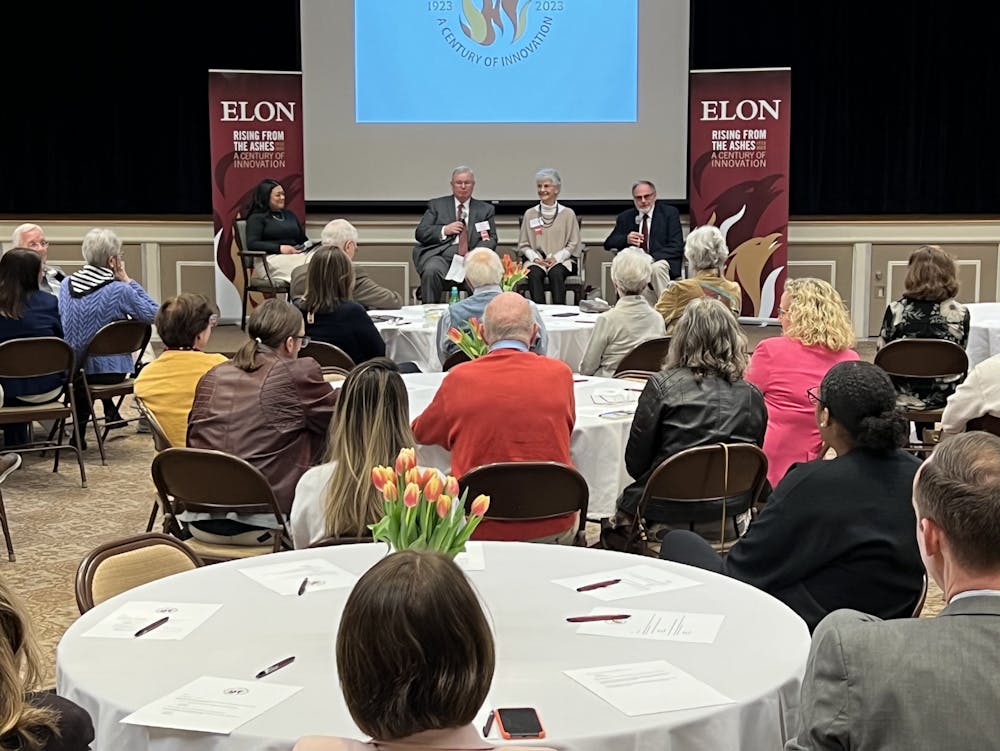McKinnon Hall was filled with laughter, celebration and curiosity last night as three panelists reminisced on their time at Elon and the growth that has occurred.
Elon University hosted “Rising from the Ashes: A Century of Innovation,” a panel that acted as one part of a year-long commemoration of the rebuilding of Elon after the 1923 fire.
The panel was moderated by Elon senior and Student Government Association’s student body president, Nadine Jose. In addition to the panel, guests ate dinner and participated in panel related trivia to win prizes.
The panel consisted of Nan Perkins, who retired in 2008 while vice president for institutional advancement; Richard McBride, who was named Chaplain Emeritus when he retired in 2009; and Gerald Whittington, who serves as senior vice president for business finance and technology, and is now serving as senior vice president and special assistant to the president.
Since Elon’s creation in 1889, the university has undergone tremendous amounts of change. One large change was in 2000, when the old mascot, the Fightin’ Christian, was replaced by the current Phoenix. McBride said he began working at Elon while the school was still Christian.
Reflecting on religious affiliation, McBride had recalled a moment that had expanded his idea of who the Elon community consisted of. He said that he realized that Elon needed to expand its community during a Christmas event, singing Christmas carols.
“There were three Jewish students in the car who said, ‘Would you say Happy Hanukkah to us?’” McBride said. “And that was my clear recognition that the community needed to broaden its understanding of who it was.”
Perkins further elaborated on who Elon is today and said students hold the most significance..
“Elon is not a bunch of buildings, Elon is people — and the students are the most important,” Perkins said. “The reason we're all here, the reason faculty and staff are here is for the students.”
Perkins said she had always felt the positivity throughout the Elon community and campus.
“Some institutions are just divided,” Perkins said. “Elon has never been like that. … Ultimately, everyone’s civil and even courteous, and a great spirit of collegiality, and it’s been a key to success.”
Sophomore Robin Falkow has felt the community and staff support that Perkins said is so prevalent in Elon.
“They put so much time and effort and support into this school and I feel like it is really paying off from their vision,” Falkow said. “I think it's really awesome that they are so invested in the student experience.”
Another area of growth for Elon has been in athletics, a space that was not so grand when Whittington first began at Elon. Whittington recalls attending an opening game against University of North Carolina, Chapel Hill. Whittington said that the idea of playing UNC when he first came to Elon was “tiddlywinks.”
“I remember sitting in my seat in the Schar auditorium, watching the two teams warm up, and I thought, ‘Man, what a moment and what a change for an institution. What a transformation of an institution.’ I was pleased to have been a partner,” Whittington said.
Hearing about the past changes, junior Aleezah Adams was inspired to think about what the future at Elon may look like.
“I am really interested to see how much the worth of our diploma grows as more students who are graduates take on the issues of the world,” Adams said. “I am interested in seeing how the university name grows and how the brand grows.”
As for the changes Whittington has already contributed to, he credits not only his own hard work but those who have worked with him as well.
“There are reams of folks, my colleagues, who worked with me to do the things that had been done, and I would rather than think, ‘Oh you did a pretty good job.’ No, we did a pretty good job.”
President Connie Ledoux Book, who attended the panel, spoke highly of the panelists and the work they have done at Elon. Book said that the panelists and other Elon leaders deserve more recognition.
“It was just through their dedication. They just kept showing up, kept working hard, and Elon today has really benefited from their dedication, yet they often don’t get the headline,” Book said. “It's a reminder to give voice to people who were doing the work on the ground and how powerful their stories are about embracing a vision and being able to build, in our case, such a fine institution.”
Having spent many years at Elon, leaving was not easy for McBride, however, he is not the only one to leave the university. McBride offers up one last piece of advice—using trapeze artists as an analogy — for graduating students who may not be ready to leave Elon just yet.
“Your job is to leap and grab it, and then it will lead you to other trapezes. Leap and grab it. We will only grow if we continue to reach for the new opportunity, the new challenge,” McBride said. “You are well prepared for this new experience, take this, and leap.”


